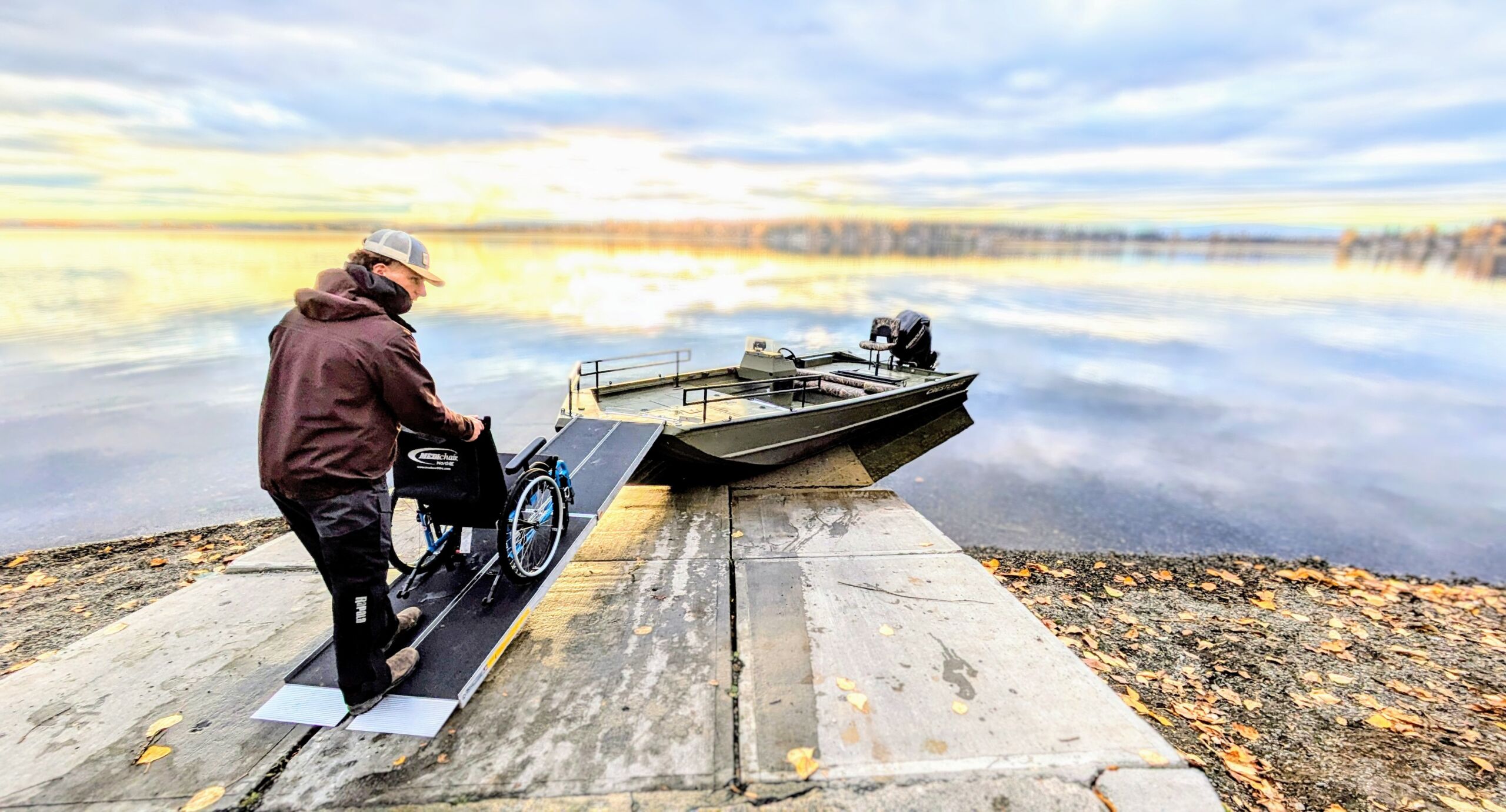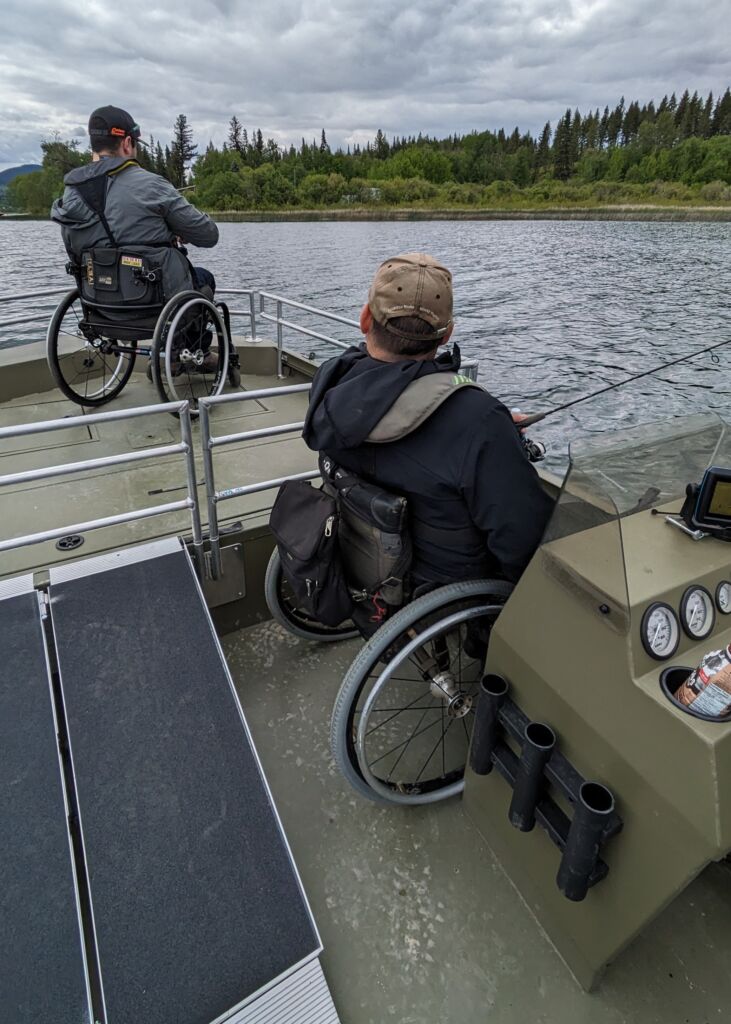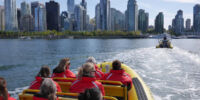
Building a More Inclusive Fishing Tourism Industry in BC
Accessible tourism isn’t just about ramps and accessible bathrooms – it’s improving or building new products and services for an expanding market. With 88 percent of people with a disability taking a holiday every year, there is a growing opportunity for BC tourism businesses to evaluate and improve their accessibility offerings to remain competitive and better support the diverse needs of all visitors.
One inspiration is Reel North Adventures, a fishing tour operator based in Prince George, BC that leads guests to some of the best lakes and rivers around the Skeena, Omineca, and Cariboo regions. Named a finalist in the Inclusive & Accessible Tourism Experience category at the BC Tourism Industry Conference Awards in March 2024, Reel North Adventures recently completed a BC fishing industry first – a customized wheelchair-accessible boat, which will launch in spring 2025. The business’s journey, including learnings along the way, offers a roadmap for other tourism providers eager to improve accessibility and inclusivity for visitors and employees.
Angling for Change: Identifying Accessibility Needs

In 2021, Jerry Daoust, owner of Reel North Adventures, had a perspective-shifting conversation with his wife, a physiotherapist. He realized that the services offered by his business were not inclusive, particularly for people with mobility issues. The biggest barrier? Getting people with disabilities onto the water to provide the same fishing opportunities available to everyone else – a barrier that has challenged the fishing industry for decades.
Jerry did a deep dive online, reading blog articles and looking at photos of boats. He found no existing boats, or blueprints for boats, that were suitable for wheelchairs. If he was going to make his business more inclusive, he realized, he would have to start from ground zero.
Through his research, Jerry came across a boat manufactured in the US for hunters. It was wide, flat-bottomed, and stable – all crucial elements of a vessel that can safely accommodate wheelchairs, strollers, and other mobility devices. He reached out to several Canadian boat manufacturers, and found a company in Prince George (CC Industries) that could add custom features to the hunting boat.
Jerry applied for federal funding through the Enabling Accessibility Fund and, when he received it, purchased the hunting boat and set to work redesigning it – with input from organizations such as Spinal Cord Injury BC – so it would be fully accessible.
Tackling the Details: Building an Accessible Industry Standard
Reel North Adventures’ new accessible boat welcomes anyone, including people in wheelchairs, elderly visitors, children, and babies in strollers. It’s 20 feet long and features a tall rail system encasing the casting deck. The rail system is completely removable, enabling a piece to come out so a ramp can be connected and tightly locked to the boat launch. Wheelchairs can roll straight from the dock onto the boat, with another on-deck ramp providing access to the stern.

The boat has capacity for two people in wheelchairs, plus four more adults and the captain. Currently, it can access a select number of lakes that are big enough to accommodate the larger-than-average design. Anyone requiring the use of the accessible fishing boat can book online, and Jerry and his team will create a custom itinerary depending on the type of fish the guests wish to catch.
Hooked on Inclusivity: Expanding Access in the Future
While the accessible boat launches in the spring, Jerry is just getting started on Reel North Adventures’ accessibility journey. He plans to further enhance the boat’s rail system to welcome people who are blind or deaf, seeking input along the way from the blind and deaf communities.
He also wants to expand to a second accessible boat that’s smaller and can take guests to more remote areas. Ultimately, Jerry’s goal is to ensure the fishing experience is universal, so everybody has the opportunity to enjoy BC’s incredible fishing tourism experiences.
Leading the Industry: Advice for Tourism Businesses
Jerry’s main piece of advice to businesses that want to improve their accessible offerings? “Look at your business and pick it apart,” he says. “Ask the important questions – what services do you offer, and what isn’t inclusive? Are there barriers for some people to experience the service or product? Dissect your operations and explore ways you can overcome these barriers.”
Businesses that are ready to remove barriers can start with low-hanging fruit – areas that are manageable and feasible to adjust, depending on budget and priorities. See below for accessibility resources offered by Destination BC to help you along the way.
Jerry and the team at Reel North Adventures set out to make their fishing experience more inclusive. Instead of admitting defeat when they came across a roadblock – the lack of commercial boats available that can accommodate people with disabilities – they designed a new boat. While making the tourism industry more accessible to everyone may come with challenges, it’s an important journey that must be embraced – and small businesses like Reel North Adventures can make a big difference.
For more information on Reel North Adventures, visit www.reelnorthadventures.com.





